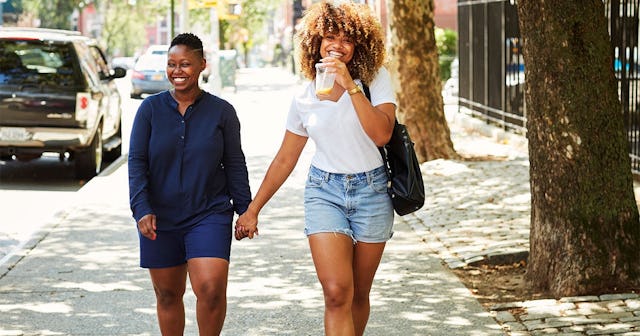The Physiological And Psychological Reasons We Hold Hands With The People We Love

I instinctively reach for the hand of the person I am dating when we are out in public together. I have grabbed the hands of my children in both panic and frustration to protect and corral them. I have also held their hands while snuggling. I have held the hands of strangers at AA meetings. I have joined circles and held the hands of teammates before and after games. But why do we do this? Why do lovers, parents, friends, and strangers all find purpose in holding hands? The reasons are wonderfully beneficial.
Touch produces feel-good chemicals.
Positive touch with another human causes a chemical reaction in our brain that produces oxytocin, also known as the cuddle hormone because it is released when we snuggle up with another person or bond socially. This feel-good chemical improves our mental and physical health. Holding hands with another person can decrease depression and anxiety and can reduce pain and blood pressure. A study published in 2016 in the American Pain Society’s Journal of Pain showed that when loved ones held hands, their pain levels were reduced. And another study published in the journal Psychological Science showed (with MRI machines) that holding hands with a loved one reduces stress.
When we hold the hand of the person we are romantically involved with, it creates an extra layer of intimacy and a feeling of safety. We also experience a cool process called “interpersonal synchronization”—the physiological mirroring of another person. Our breathing patterns begin to match our partner’s when we hold their hand; this is similar to matching someone’s gait while walking. Being in sync with your partner strengthens connection, which bleeds into trust and security. All of this makes us feel really good.
Hand-holding is a sign of affection.
I have friends who will hold hands with each other in non-romantic ways. They will simply reach over and grab each other’s hands while they sit together or while on a walk together. I have watched grown adults hold the hands of their parents as easily as they hold their own child’s hand. It is a visual sign that you feel connected to someone, and it is a tangible way to feel that closeness. In some countries and cultures, holding hands—even between same-gender people—is a common signal of care. Arab and Indian men, for example, are often seen holding hands.
Skin-to-skin contact is not just beneficial for parents and their children; friends and family members benefit from touch too. Most touch we experience is not sexual, and holding hands should not be viewed as an act just between romantic partners. It is a sign that we are able to be confidently vulnerable and connected with someone we love.
Holding hands is instinctive.
Much like throwing an arm in front of the passenger in a car we’re driving during a scary moment, reaching for the hand of the person next to us in trying situations is a reflex we have known since childhood. When we’re scared, nervous, or sad, we reach for the person next to us even if we don’t know them. Perhaps we recall a time when we were young and felt comforted by holding hands with someone and can’t help but look for that same sense of grounding and relief in another person’s hand. Or maybe we were born to hold hands. Babies often reach for and grip the finger of a caregiver. That connection often forces eye contact which helps babies read facial expressions, helps them bond to us, and allows them to start communicating in nonverbal ways.
Our skin is our biggest organ, and by holding hands with someone we are benefiting from the sensitivity of what we were given at birth to make ourselves feel better. The Touch Research Institute (TRI) says that holding hands can regulate our nervous system, which is what we often need in time of grief, shock, or fear. Think about the times you watched a scary movie, had a medical procedure done, or had to speak in public; we naturally look for someone with whom we can white-knuckle our way through. We can thank the vagus nerve because holding hands stimulates it and puts us in a relaxed state.
It can be an act of resistance.
While all humans benefit from holding hands in similar ways, not all people who hold hands are perceived in the same way. I, like many other queer people, have had to resist my instinct to hold the hand of a partner. The reality of my world is that I am not always safe to show any sign of affection to the person I love. I would absolutely benefit from the reduction of stress in those particular situations if I could hold my person’s hand, but the risks sometimes outweigh those benefits and the priority becomes getting home safely.
I, and others, have also held hands as an act of resistance or defiance. It is a very clear sign of pride and a message that even if I am afraid, I will not let the world dictate who I can love. This is a privilege not all LGBTQIA+ folks have. Queer people of color, specifically transgender women, are at a higher risk of harassment and hate crimes. No one should have to think twice about reaching for the security that hand-holding can give us, but the reality is that at times our instinct to survive trumps our instinct to feel good.
Reach out and grab the hand of someone you love whenever you can; it could be the best thing you do for yourself all day.
This article was originally published on